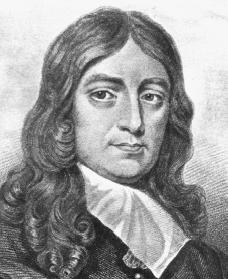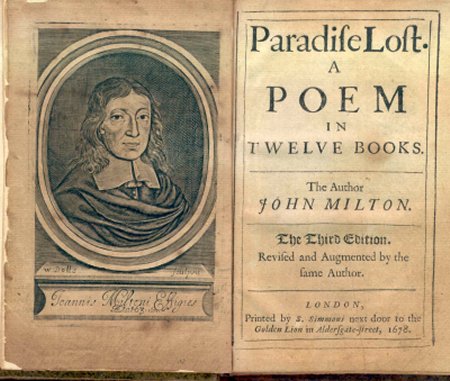
|
MILTON AND PARADISE LOST One of the most important figures ever to feature in the history of literature is John Milton. Milton is perhaps the last great classicist. His influence on the Romantics is obvious – Blake entitled his symbolic epic “Milton” and Keats early poem “The Fall of Hyperion” was so heavily influenced by Milton that he abandoned it in order to develop his own identity as a poet. Milton is perhaps best known for the epic poem “Paradise Lost”, published in 1667, a version of the first book of Genesis which was published at just the right time. The biggest selling book at the time of “Paradise Lost” was Bunyan’s religious allegory “Pilgrims Progress” – people were seeking Bible substitutes. “Paradise Lost” has been continued to be treated as a Bible substitute, having been appropriated as the great Protestant text. But it is not entirely suitable – the casting of Satan as the hero is perhaps what marks it out more than anything else.
Milton had a classical education at St. Paul’s School and then Christs College, Cambridge. This may have had some influence on his works, as we shall see later, but this was not the sole influence behind the intellectual feel of his works. Around some time in the late 1630’s, he travelled to Italy and met Galileo. Galileo had just been condemned as a heretic by the Roman Catholic Church for claiming that the Earth revolved around the sun. As a Protestant, this would not have affected Milton – and he himself was no stranger to controversy, with his writings supporting divorce causing him to labelled an advocate of immorality. Galileo was also one of the major intellectual thinkers of the period, and may have helped to shape Milton’s modernity as an intellectual. Milton’s early sonnets include “L’Allegro” and “Il Pensoreno”, companion pieces which advocate two styles of life – the carefree and the studious. This would come to be echoed in the diptych style of a lot of Romantic poetry, such as William Blake’s “Songs of Innocence and Songs Of Experience.” His best known sonnet, however, is probably “On His Blindness”, written in 1655. This is the first time that Milton had written about his blindness in poetry – after suffering with deteriorating sight for some years, he had gone completely blind three years prior to the publication of “On His Blindness,” and the way the subject is dealt with was probably not drawn from experience alone. His classical education may once again have had some benefits – the sight and blindness imagery, also conveyed through the contrast of light and darkness imagery, is reminiscent of the classical Greek tragedy, Sophocles' “Oedipus.” Milton would return to the theme of blindness later on in his disturbing verse drama, “Samson Agonistes”, published in 1671. Milton’s best known works are “Lycidas”, an elegy to his Cambridge University friend Edward King, and of course, the great epic “Paradise Lost.” Dictated to his wife due to his blindness and published in 1667, although it is a document of the Fall of humanity, the influence of Dante’s “Divine Comedy” is also prominent. “The Divine Comedy” was the key epic at the time, but distinctly Catholic – “Paradise Lost” is Milton’s attempt to write an epic on the same scale, but in the Protestant tradition.
There are a few key distinct key features to “Paradise Lost”- the first is the aforementioned role of Satan as a hero. Satan is cast as a hero (or it has least been regularly interpreted this way, including by the Romantic poets Blake and Shelley) because he constructs the temptation which leads mankind out of the Garden of Eden. Being stuck in the Garden of Eden is for Milton no good to us – the expulsion was vital to aid mankind as a whole. This is what makes “Paradise Lost” such a great treatise on the subject of free will. Whilst the modern reader may imagine that this must have seemed radical to readers in 1667, the truth is that Milton’s classical education may have had some bearing on this. The ideas of the second century “heretics” the Gnostics may have been a part of Milton’s education. Gnosticism is difficult to define, not being any one group – Jonathan Z. Smith describes it as merely a “structural possibility”, but a general belief in matter as evil is what colours it as a belief, and their scripture in the Nag Hammadi library also shows a slightly heroic serpent giving Adam and Eve the opportunity to use free will and escape the materialism of the Garden of Eden. They were also influenced by light and darkness imagery which may have been another influence on “On His Blindness” and “Samson Agonistes.” Milton’s earlier pamphleteering on freedom (notably 1644’s “Aeropagitica” on the freedom of the press uses a lot of Adam and Eve imagery which anticipates ‘Paradise Lost’) takes a more creative form in his depiction of Satan. Satan has been expelled from Heaven in the same way that Adam and Eve are from the garden of Eden, and for him this is a superior position to be in as he has more freedom through his reign (“Better to reign in Hell than serve in Heaven”). Alliteration usually has the effect of rushing a poem and speeding up the rhythm, but the alliteration of “Hell” with “Heaven” in the line here balances the rhythm so that it may be read at any speed, but the effect is almost wickedly delicious, a triumphant rallying cry at the end of a verse full of careful reasoning.
Eve is not an anti hero for Milton; Adam is as much to blame in the Fall. But, as in Genesis, it is Satan who engineers the temptation which makes him such a hero. The moment in which Eve bites the forbidden fruit is almost sensual in the passion behind the words, as we can see in the famous lines “her rash hand in evil hour/ Forth reaching to the fruit, she plucked, she eat.” It has also been pointed out, however, that the whole book anticipates Eve’s biting of the fruit and when she actually does it is compacted into just a few words and two simple actions – “she plucked, she eat.” The preceding lines of “her rash hand in evil hour” are excitable and Eve’s biting of the fruit should, considering the rest of the text, be an almost sexual burst of a climax. And yet it is deceptively simple – one woman's basic action which spells out the future for the whole of humanity. Milton continues by writing that “Earth felt the wound, and Nature from her seat/ Sighing through all her works gave signs of woe/ That all was lost.” The personification of nature here anticipates the Romantics attempts to be one with nature. Her “sighing” and “woe” give a feeling of desolate sadness to these lines, but all is not lost. Adam and Eve have gained a future for humanity on Earth. The final lines of “Paradise Lost”, known as “The Expulsion from Eden,” describe Adam and Eve moving on and virtually creating humanity, but there is still a sense of desolate sadness – they are “solitary” and their steps “slow”, but this is simply the beginning. The story which follows will make a more fulfilling conclusion for Adam and Eve. By writing “Paradise Lost” Milton said that we wished to “assert eternal Providence/ and justify the ways of God to men.” Milton is often criticised for his arrogance and belief in his own greatness as a poet, and this statement is a fine example of that. But is it true? A popular modern reading of “Paradise Lost” is that it does not so much justify the ways of God to men as the ways of men to God. Given that the Fall has always been seen as a negative thing for which man must be punished for, and Milton is casting it in a new light, this is probably a more apt reading. Its conclusions and final lines are a quiet form of triumph over adversity, gaining something through losing something, which echoes the moving final lines of “Lycidas”, “At last he rose, and twitched his mantle blue/ Tomorrow to fresh woods, and pastures new.”
Four years after “Paradise Lost”, Milton would publish a four book sequel, “Paradise Regained,” in which Satan has been overthrown and Jesus is successfully resisting his temptations. After the loose ends of “Paradise Lost”, “Paradise Regained” may have been what the world was waiting for, but it is “Paradise Lost” which remains Miltons most enduring masterpiece to this day. Amy Britton
|




